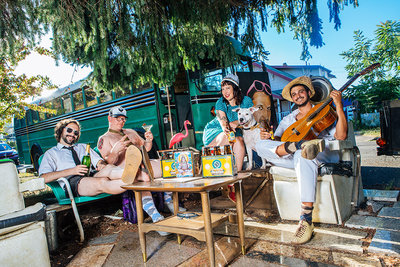
The Whiteaker Block Party will not be televised.
As an annual expression of the contested soul of the Whit, the block party is a shot in the arm for the communal side of neighborhood living, in all its sloppy, carnal, artistic glory. It’s at the Whiteaker Block Party that seething, sweaty mobs — gawkers and gackers, locals and carpetbaggers, heps and asshats — coalesce in celebration of the creativity that springs up when a once-and-former slum becomes home to a ragtag coalition of beautiful losers.
No, the block party on Aug. 1 will not be televised and, according to Chris Gadsby, nor will it be co-opted, coerced or cornered into canned nostalgia. As one of the founding members of WBP, Gadsby says one simple thing keeps the block party from becoming yet another reified monster of moneymaking: It’s free.
“In the beginning, I don’t think people really understood what was going on,” Gadsby says. “They were amazed nobody was trying to make money from them. The more corporate donors you have, the more you want to make money. Once you do it for money and not love, it’s over.”
In the beginning, then, the block party sprang from something called the “Whiteaker Cocktail Society,” whose toast and rallying cry was “Cheers, bitches!” The Whiteaker Cocktail Society was a small, casual gathering of friends that included Gadsby, his then-wife Zoe Gadsby and Bradley “Uncle Brad” Coffey, who passed away in 2011. “We wanted to show the town what the Whiteaker had to offer,” Gadsby says of the genesis from cocktail night to neighborhood blowout. “It had real organic, simple beginnings fueled by Pabst.”
That was in 2006, when something like 1,000 folks hit the first block party, wandering the ad-hoc stages along Blair and its cross streets, including the legendary G-Spot on Third where the Gadsbys lived (and where Chris still resides). Girin Guha, another founder, remembers that for the inaugural block party he tapped an inheritance to pay for sawhorses and port-o-potties. “The infrastructure was those two things,” Guha says.
From there things just exploded. By the third year, the organizers of WBP realized they’d given birth to a real beast. Gadsby puts it like this: “Year one, chill. Year two, awesome. Year three, like, fuck.”
Fuck, as in fuck yeah, though not without its concomitant headaches, including skyrocketing expenses to tackle everything from liability insurance, increased infrastructure costs and a mandatory paid police presence that, this year, is running them more than $6,000.
What these costs mean is that the core organizers work year-round to put on the block party, securing permits and seeking out sponsors. Oddly, many of the businesses that benefit from the hordes of people attending the one-day celebration fail to kick in a cent. Those that do — Ninkasi, Hop Valley, Blairally, Meiji and Papa’s Soul Food are among the few — have helped to keep this grassroots festival alive.
Alive, and getting bigger each year. Zoe Gadsby guesses the WBP last year drew upwards of 7,000 people, which presented its own logistical nightmares, including an eleventh-hour permitting snafu that got ironed out just in the nick of time. This year, she says, things have gone a lot smoother with the city, thanks to Colette Ramirez, a community events manager in Eugene’s Cultural Services department.
“Without Colette, there might not have been a block party this year,” she says.
WBP secretary Jason Vanderhaar says that such overcoming of obstacles is in keeping with the spirit of the Whit. “That’s the best thing about the block party,” he says. “People come together to handle it. It gets taken care of to everyone’s satisfaction.”
Last year was the first time WBP sold out of vendor slots, Vanderhaar says, noting that this year the growth continues, with more than 150 bands applying to play the party and nearly a dozen nonprofits making an appearance, including booths for the Oregon Democratic Party, Womenspace, Willamette Animal Guild and Sponsors.
And yet, despite these signs that the Whit is becoming the it-place, Chris Gadsby insists that WBP will do its best to maintain its more or less spontaneous, ad-hoc neighborhood feel. “It’s organic,” he says. “It’s full of community. It’s free… As it’s gotten bigger, the douches do come in, the bros. But you don’t discriminate. It’s all inclusive.”
The proof, Gadsby points out, is in the carefree atmosphere that persists at the block party, despite the sheer numbers. “It’s still a block party,” he says. “Everybody on Third Street is still sitting outside, having a block party. Friends are chilling out.”
And, in the end, profit be damned. Zoe Gadsby puts it best, summing up the beloved ambivalence folks are feeling these days about the Whit: “We love it so much, but right now I sort of hate it, too. There’s no fame; there’s no fortune. We’re trying to make it more not-corporate and more community run. All we want to do is break even.”
The Whiteaker Block Party runs noon to 10pm Satuday, Aug. 1; admission is free, visit whiteakerblockparty.com for more info.